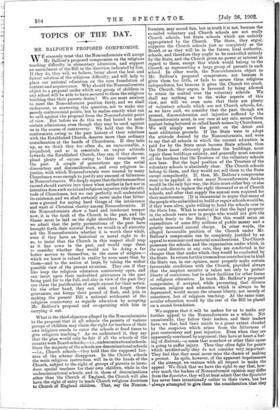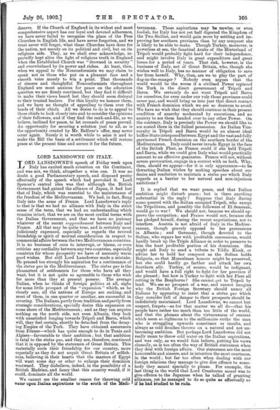TOPICS OF THE DAY.
MR. BA IXOUR'S PROPOSED COMPROMISE.
WE sincerely trust that the Nonconformists will accept Mr. Balfour's proposed compromise on the religious teaching difficulty in elementary education, and support an amendment of the Bill in the direction indicated by him.
If they do, they will, we believe, bring about the best and fairest solution of the religious difficulty, and will help to place our national education on the sure foundation of content and acquiescence. Why should the Nonconformists object to a proposal under which any group of children in content and acquiescence. Why should the Nonconformists object to a proposal under which any group of children in any school will be able to have secured to them the religious teaching that their parents desire? We are most anxious to meet the Nonconformist position fairly, and we shall endeavour, in answering this question, not to make any merely controversial points, but to realise exactly what can be said against the proposal from the Nonconformist point of view. But before we do this we feel bound to make certain admissions, even though they may be used against us in the course of controversy. We hold that the Non- conformists, owing to the past history of their relations with the Established Church, deserve more than ordinary consideration at the hands of Churchmen. If they take up, as we think they too often do, an unreasonable, a prejudiced, and so in essentials an unjust attitude towards the Established Church, they can, if they choose, plead plenty of excuse owing to their treatment in the past. A couple of generations ago the social discourtesy and disconsideration, and even religious in- justice, with which Nonconformists were treated by many Churchmen were enough to justify any amount of bitterness in Nonconformists. We deeply regret that thebitterness thus caused should survive into times when neither in fact nor in intention does such social and religious injustice rule the atti- tude of Churchmen, but we can perfectly well understand its existence, and we shall certainly never make that bitter- ness a ground for saying hard things of the intolerance and want of Christian charity among Nonconformists. If the Nonconformists show a hard and intolerant temper now, it is the fault of the Church in the past, and the blame must be laid on the right shoulders. But though we admit that the petty persecutions of the past have brought forth their natural fruit, we would in all sincerity ask the Nonconformists whether it is worth their while, even if they have an historical or moral right to do so, to insist that the Church in this respect shall reap as it has sown in the past, and would urge them to consider whether they would not be doing a far better service to themselves, to the cause of religion— which we know is valued in reality by none more than by them—and to the nation at large, by taking the widest possible view of the present situation. They can if they like keep the religious education controversy open, and can insist upon their undoubted grievances in the past being paid for to the full, and also in view of the past they can claim the justification of ample excuse for their action. On the other hand, they can sink and forget those grievances, can forego their pound of flesh, and join in making the present Bill a national settlement of the religious controversy as regards education by accepting Mr. Balfour's proposal and co-operating with him in carrying it out.
What is the chief objection alleged by the Nonconformists to the proposal that in all schools the parents of various groups of children may claim the right for teachers of their own religious creeds to enter the schools at fixed times to give religious teaching ? As we understand it, they say that the plan would only be fair if all the schools of the country were Board-schools,—i.e., undenominational schools. Since the majority of the schools are denominational schools —i.e., Church schools—they hold that the supposed fair- ness of the scheme disappears. In the Church schools the main religious instruction will be in the hands of the Church, subject to the right of groups of parents to intro- duce special teachers for their own children, while in the undenominational schools, and in those of denominations other than the Church of England, the Church will also have the right of entry to teach Church religious doctrines , to Church of England children. That, say the Noncon- I formists, may sound fair, but in truth it is not, because the so-called voluntary and Church schools are not really- Church schools, but State schools which are unfairly appropriated by the Church. The State, they argue, supports the Church schools just as completely as the Board, or as they will be in the future, local authority, schools, and therefore they ought to be controlled entirely by the State, and the Church given no power or interest in regard to them, except that which would belong to the Church as representing a large group of parents in each school. In other words, the Nonconformists object to Mr. Balfour's proposed compromise, not because it gives them too little, or fails to secure them religious independence, but because it gives the Church too muck The Church, they argue, is favoured by being allowed to retain its control over the voluntary schools. We shall say nothing as to the wider aspects of this view, nor will we even note that there are plenty of voluntary schools which are not Church schools, for, as we have said, we consider that the past, though not present, disconsideration and injustice suffered by the Nonconformists must, in our case at any rate, secure them against being lectured or called harsh names by Churchmen. We will simply meet the point on the driest and most utilitarian grounds. If the State were to adopt the attitude desired by the Nonconformists, and were to say that all schools in which the current education is paid for by the State must become State schools, then the State must obviously purchase the buildings, must repair those buildings entirely, and generally must assume all the burdens that the Trustees of the voluntary schools now bear. But the legal position of the Trustees of the voluntary schools is absolutely clear. The Church schools belong to them, and they would not sell them to the State except compulsorily. If, then, Mr. Balfour's compromise were to be applied in what many Nonconformists declare would be the only fair way, the State must either buy or else build schools to replace the eight thousand or so of Church schools, and after that supply the annual sum required for their maintenance. [It is immaterial to argue that many of the people who subscribed to build or repair schools would be, if they were alive, quite willing to hand the schools over to the State free. What is material is that the legal property in the schools vests now in people who would not give the schools freely to the State.] But this would mean an expenditure of some fifty millions of public money and a greatly increased annual charge. In other words, the alleged favourable position of the Church under Mr.
Balfour's compromise can be completely justified by an appeal to economic and material considerations. The Church possesses the schools, and the organisation under which, in the rural districts at any rate, they are conducted is far cheaper than that under which they would be conducted by the State. In return for this tremendous contribution in kind the State can, in our opinion, most properly make certain favourable conditions with the Church, provided always that the amplest security is taken not only to protect liberty of conscience, but to allow facilities for other forms of religious education. In truth, Mr. Balfour's proposed compromise, if accepted, while preventing that divorce between religion and education which is always to be deprecated, would secure the utmost liberty, not merely of conscience, but of religious teaching. At the same time, secular education would by the rest of the Bill be placed on a sound foundation.
We suppose that it will be useless for us to make any further appeal to the Nonconformists as a whole. Nut unnaturally, they follow their leaders, and their leaders have, we fear, had their minds to a great extent clouded by the suspicion which arises from the bitterness of past controversy and past injustice. Even when they are apparently convinced by argument, they have at heart a feel- ing of distrust,—a sense that somehow or other their cause is going to suffer injury. Thus they often fight for points which intellectually they do not consider very important. They feel that they must never miss the chance of making a protest. In spite, however, of the apparent hopelessness of the attempt, we venture with all respect to make the appeal. We think that we have the right to say that, how- ever much the leaders of Nonconformist opinion may differ from the Spectator, they will at least admit that the Spectator has never been intentionally unfair to their views, but has always attempted to give them the consideration that they deserve. If the Church of England in its widest and most comprehensive aspect has our loyal and devoted adherence, we have never failed to recognise the place of the Free Churches in English life, and have never forgotten, and we trust never will forget, what these ,Churches have done for the nation, not merely on its political and civil, but on its religious side. They, as we shall ever acknowledge, re- peatedly kept alive the light of religious truth in England when the Established Church was " drowned in security " and overwhelmed by its power and riches. At least, then, when we appeal to the power we may claim to speak not as those who put on a pleasant face and a smooth voice merely to win a point. That thousands of sincere and thoughtful Nonconformists throughout England are most anxious for peace on the education question we are firmly convinced, but they find it difficult to make their views heard lest they should seem disloyal to their trusted leaders. For this loyalty we honour them, and we have no thought of appealing to them over the heads of their chiefs. All we desire to do is to appeal to those chiefs to look closely into and to consider the opinions of their followers, and if they find the rank-and-file, as we believe, inclined for peace, to let counsels of peace prevail. An opportunity for securing a solution just to all, as is the opportunity created by Mr. Balfour's offer, may never occur again. Surely it is worth while to seize it and to make the Bill the basis of a settlement which will restore peace at the present time and secure it for the future.







































 Previous page
Previous page